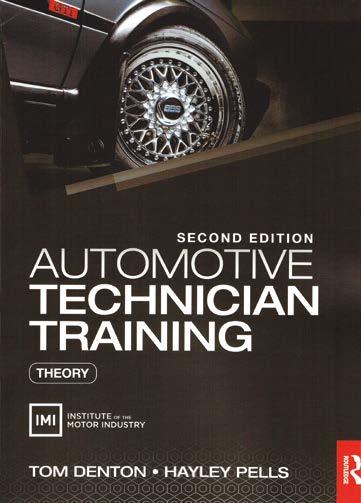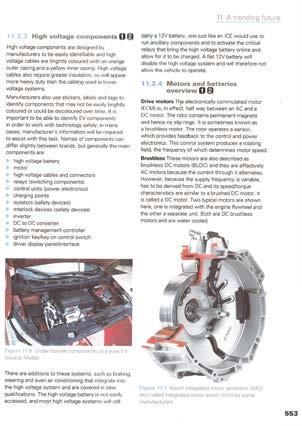
3 minute read
Pells & Denton book review
Book Review: Automotive Technician Training Theory, Second Edition - By Tom Denton and Hayley Pells
In many ways, it is amazing that this book exists. Cramming virtually every facet of automotive technical theory concisely into a single textbook is a virtually impossible task. Yet, possessing considerable clout as automotive practitioners, consultants, educators and writers, both authors of Automotive Technician Training Theory have risen to the challenge and succeeded.
Advertisement
To focus the content, Denton and Pells include all of the information that students need to pass Levels 1, 2 and 3 qualifications in Light Vehicle Maintenance and Repair. The authors strive hard to make a sizable 570pp textbook as undaunting and accessible as possible but without patronising their readers. Health and Safety information, details about how the motor industry works (including vital information about how to communicate face-to-face with customers – a skill that many Gen Zs may find essential) kick-start the book. More general advice about workshop skills and vehicle maintenance are followed by chapters that probe the theoretical intricacies of combustion engines, electrical systems, suspension/ steering/brakes, transmissions and advanced diagnostics. Allnew sections on high-voltage and ADAS systems update the book successfully.

Information is wellpresented and concise. The use of images and diagrams are excellent. The 2022 Second Edition includes new sections on highvoltage and ADAS.The Second Edition of Automotive Technician Training Theory is available either as an e-book, or in paperback forms, costing from £31.95 at www.tomdenton.org Published by Routledge, ISBN: 9781032002200
This Second Edition continues its predecessor's approach to blended online learning. Yet, obtaining full benefit requires admittance to the IMI eLearning system. While most colleges have access, readers who are unprepared to shoulder the additional costs can utilise the free additional resources on www.tomdenton.org. This website boasts additional
activities to support the book, from learning hints, activity sheets, puzzles and quizzes. However, we feel that this part of the blended learning experience requires updating and making more user-friendly to match the high standard set by the textbook.
It is fortunate that pictures tell a thousand words, because illustrations, press images and real-world workshop pics are well-used to create an uncluttered layout. The writing is clear, concise and both authors' styles blend well. While intended to cover the basic theory, some topics go into considerable detail (such as the workings of Bosch's e-clutch), which makes the title useful for those with more advanced knowledge.
Yet, while the textbook succeeds in its aims, it could have updated the First Edition more comprehensively. Being ultra-critical, no details feature about EFB batteries and LED headlights, which have been common fitments for at least five years. Additionally, some tech examples are relatively old-fashioned, such as three pages dedicated to the Ford CTX CVT from 1987, or deep discussion of the Volkswagen Group's DSG6 but no mention of the more popular DSG7 DCT. While it is likely that these updates will follow in future editions, we should remember that this book's core audience is students. Therefore, the content must reflect course and exam contents and the hardware present within a typical educational establishment.

